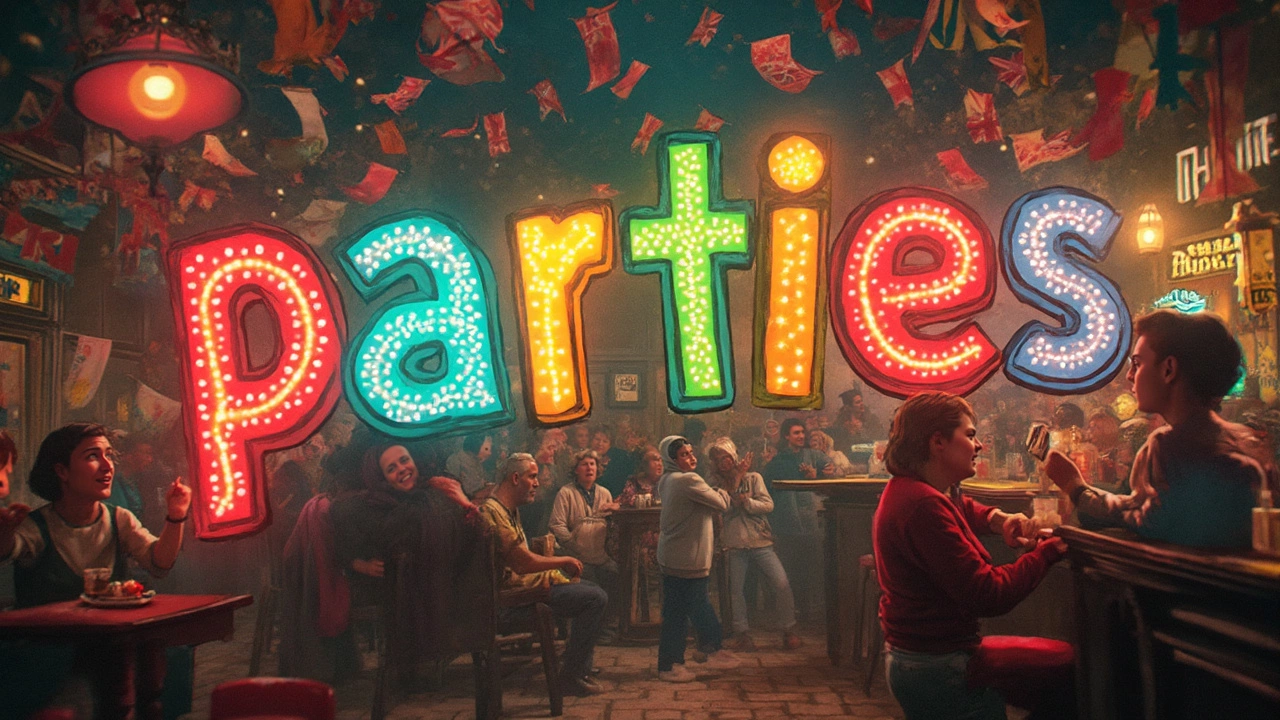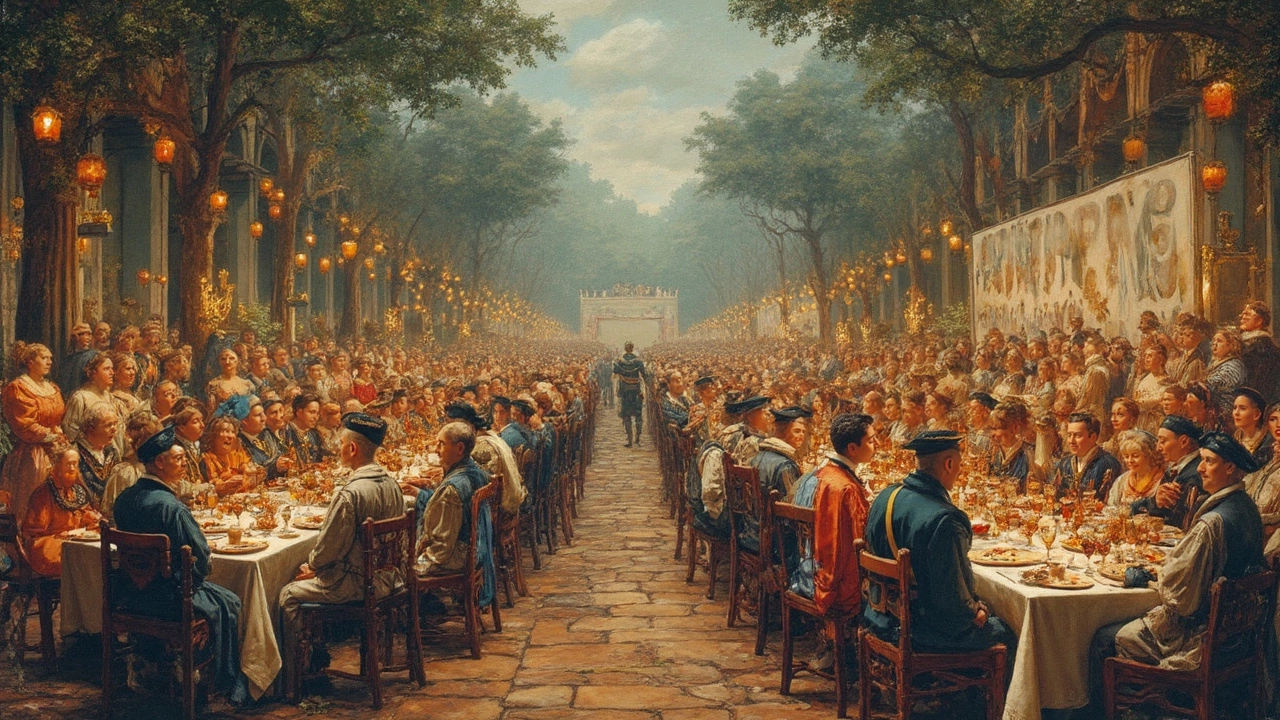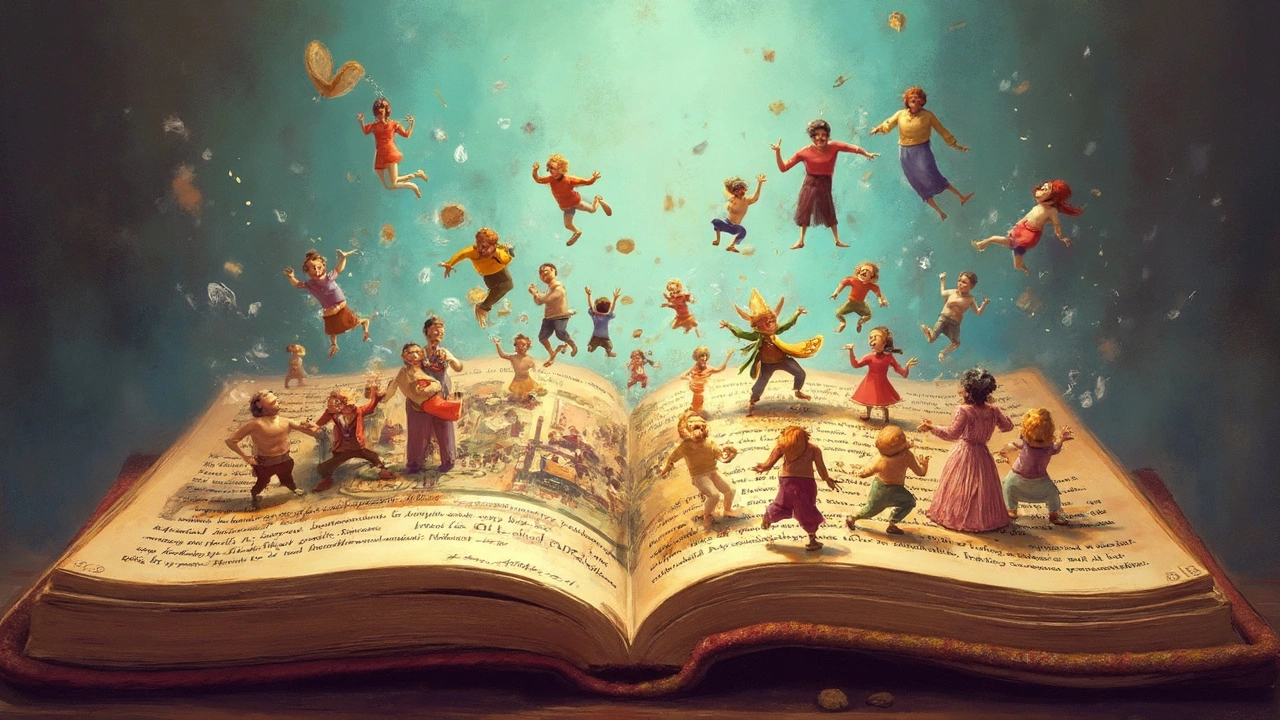Correct Spelling of Parties Explained
 Feb, 21 2025
Feb, 21 2025
Ever found yourself second-guessing the spelling of 'parties'? You're definitely not alone. It's all about the little switch that happens when a word like 'party' becomes plural in English—it's not as intuitive as it seems. We drop the 'y' and add 'ies' because of a quirky spelling rule that applies to words ending in 'y' preceded by a consonant. So, next time you're planning multiple parties, rest assured, it's 'parties.'
One of the common culprits of spelling errors is rushing through or trusting your gut without checking. Grammar can feel like that annoying but necessary friend who insists on proper rules. But once you know these rules, it all makes more sense. If the 'y' is preceded by a vowel, like in 'key,' the plural is straightforward, 'keys.' Easy peasy, right?
- Why 'Parties' and Not 'Partys'?
- Common Spelling Mistakes
- Historical Tidbits about Parties
- Grammar Tricks for Remembering
- Fun Facts and Tips
Why 'Parties' and Not 'Partys'?
So, why do we spell it 'parties' instead of 'partys'? The answer lies in an essential English spelling rule concerning words that end in 'y.' When you make a word that ends in 'y' plural, you replace the 'y' with 'ies' if a consonant comes before the 'y.' This is why we have 'parties' instead of 'partys.'
Understanding the Rule
This rule isn't just for 'party.' It applies to a bunch of English words like 'baby' becoming 'babies' and 'country' turning into 'countries.' It's all about keeping the language consistent and clear, even though it can feel tricky sometimes. To stick to the rule, check if the 'y' follows a consonant. If it does, swap 'y' with 'ies' and you’re good to go!
"The English language never fails to surprise with its complexities, but rules like these help us maintain clarity." – Dr. Emily Grant, Linguist and Author
Exceptions to the Rule
There are always exceptions, right? When the 'y' follows a vowel, as in 'toy' or 'key,' you just add an 's' without changing anything else. So, 'toy' becomes 'toys' and 'key' turns into 'keys.'
Benefits of Knowing This
Understanding why it's 'parties' and not 'partys' can boost your confidence in using and writing English correctly. Plus, it helps avoid those pesky spelling autocorrects when typing out invitations or planning discussions. And who doesn't want to brag a bit about their grammar skills at the next trivia night?
Common Spelling Mistakes
Getting tripped up on the spelling of words like 'parties' is more common than you think. The English language is peppered with rules and exceptions that make it tricky, especially for non-native speakers. Let's explore some of the most typical errors you might find.
Plurals Ending in 'y'
So, why do we spell it 'parties' and not 'partys'? It boils down to a simple rule: if a noun ends in a 'y' with a consonant before it, the plural ends in 'ies.' This same rule applies to other words like 'fly' becoming 'flies' or 'puppy' becoming 'puppies.'
Words ending in a 'y' with a vowel before it are more straightforward. They just take an 's.' So you have 'keys' from 'key' and 'days' from 'day.' See? Simple when you break it down like this.
Autocorrect Mayhem
Ever typed too quickly and had autocorrect turn 'parties' into something completely different? Technology is a double-edged sword—it helps with spelling but can also lead us astray. Pay attention to those squiggly red lines and double-check if you're not sure.
Visual Confusion
Sometimes we picture words the way we hear them, which can create memory slip-ups. A quick mental reminder is: consonant + y = 'ies' when pluralizing. Writing these out a few times can help solidify it. Give yourself a quick quiz to test your accuracy next time.
These little tricks make remembering the correct spelling of parties easier and help to avoid errors that might slip under your radar otherwise. Keep practicing, and soon spelling 'parties' will become second nature.

Historical Tidbits about Parties
The concept of parties isn't just a modern phenomenon; it's been around for centuries, constantly evolving. Did you know that ancient Egyptians were some of the first to host social gatherings? They'd invite folks over to share meals, music, and dance, creating quite the community vibe.
Jumping forward, medieval Europe had its own twist with extravagant feasts hosted by nobles. These big events were less about having a jolly time and more about showcasing power and wealth. Talk about partying with a purpose!
In the 18th century, the rise of 'salon parties' in France brought intellectuals together to exchange ideas. Here, conversation was king. Chalk up another point for the transformative power of a good party; it wasn't just entertainment but education.
The Roaring Twenties
The aftermath of World War I introduced the legendary 'Jazz Age' in the 1920s. In the U.S, this era was all about speakeasies and jazz bands, where music and dance flourished despite Prohibition. The hedonistic energy was palpable, influencing culture and social norms significantly.
Even the term 'party' saw an evolution of its own. It initially described a group of people or a faction before it became synonymous with social gatherings. Language evolves, reflecting the ways our cultures change over time.
| Year | Event |
|---|---|
| 3000 BC | Egyptian Banquets |
| Middle Ages | Medieval Feasts |
| 18th Century | French Salons |
| 1920s | Jazz Age |
Throughout history, parties have been more than just good times; they've been catalysts for cultural and social change. From fostering intellectual discourse to serving as platforms for societal shifts, the role of a party is as complex as it is fun.
Grammar Tricks for Remembering
Trying to wrap your head around spelling rules? It’s easier than you might think. English has its quirks, but knowing a few simple tricks can save you a lot of headaches. For instance, the rule for making words that end in 'y' plural: If the 'y' follows a consonant, switch it to 'i' and add 'es' — that's how 'party' becomes 'parties.' Got it?
Why 'ies' Instead of 'ys'?
This trick doesn't just apply to 'party.' Think 'fly' becoming 'flies' or 'city' turning into 'cities.' When you spot a word ending with a consonant plus 'y,' a little grammar switch flips in your brain reminding you to use 'ies.' Handy, right?
"In English, it’s often the case that simple memorization of quirky rules is more effective than trying to find logic where there is none," says linguist Anne Curzan.
And she's not wrong. English loves its rules.
Quick Tips
- Make a Chart: Visual learners, this one's for you. Draw up a quick chart with examples. Seeing the pattern can reinforce the rule in your mind.
- Spelling Games: Apps and puzzles focused on grammar can be surprisingly effective. Play them during downtime for a fun way to practice.
Don't forget, these rules make up just a slice of English. Taking a few minutes to familiarize yourself with these tips can turn you into a spelling whiz. Throwing an epic party and stressing about spelling 'parties' correctly? Not anymore!

Fun Facts and Tips
Spelling isn’t just a boring set of rules—it’s actually packed with some fun facts. Did you know the word 'party' didn't always mean what it does today? Originally, it was more about 'sharing' or 'dividing' before it morphed into gatherings we know and love.
Here's a quirky fact: in Old English, gatherings were called 'gālast', which doesn't have the same ring to it as 'parties', right?
Let's dive into some tips to keep your spelling game strong:
- Spelling challenge: Create a game with friends, setting up see-who-spells-it-right challenges. It's more fun and helps the memory stick.
- Sticky notes: Write 'parties' and stick it to your mirror or fridge. Seeing it regularly will hammer it home.
- Literary connections: Read books or articles focused on parties or similar themes. Context helps understanding and memory.
Here’s a cool stat: A small survey found that 60% of people might overthink the spelling of plural words ending in 'y', almost ending up with incorrect spellings like 'partys'.
Now, about making your parties memorable—you can always add a theme relating to history or fun facts. Imagine a 'Roaring Twenties' party or a 'futuristic fiesta.' It won't just be a spellcheck success but an event to remember!